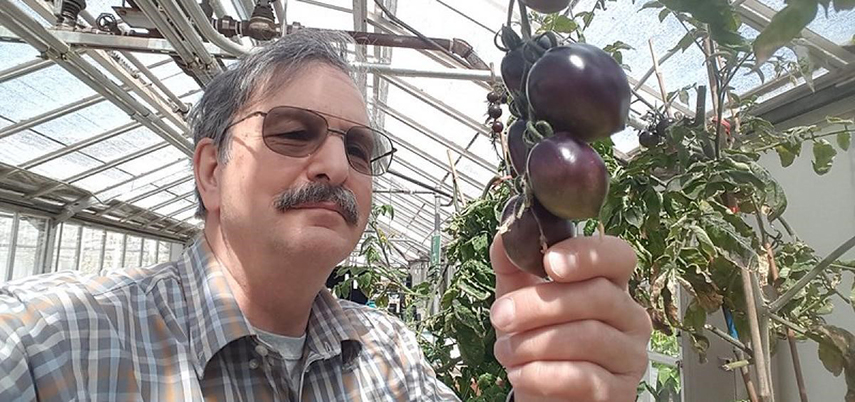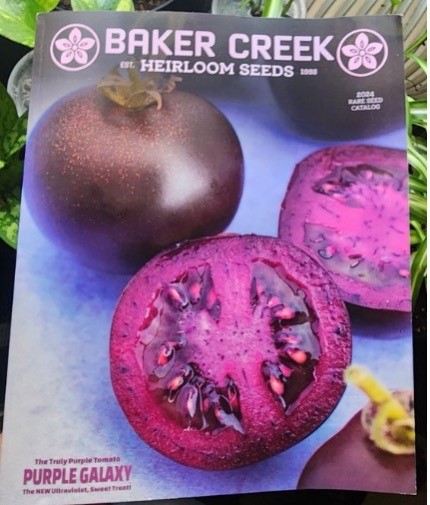Rotten tomato: Biotech company makes false claim about its GMO purple tomato

Norfolk Healthy Produce says its patented GMO technology is the only way to develop a purple flesh tomato containing antioxidants but Oregon State University developed an antioxidant-rich purple tomato more than a decade ago using traditional plant breeding.

Baker Creek Heirloom Seed Company featured its Purple Galaxy tomato on the cover of its seed catalog but later removed it when a biotechnology company claimed the tomato was their patented GMO variety
Norfolk Healthy Produce, a UK-based biotechnology company that developed a much-hyped purple tomato, claims on its website that “the only reported way to produce a purple-fleshed tomato rich in anthocyanin antioxidants is with Norfolk’s patented technology.” Norfolk is wrong. Oregon State University developed two purple tomato varieties using traditional plant breeding. The first, Indigo Rose, which OSU said is the “first antioxidant-rich purple tomato available on the market, was developed in 2011. In 2021, OSU announced development of the second non-GMO purple tomato, Midnight Roma.
Indigo Rose was bred by Jim Myers, vegetable breeder and professor in the OSU College of Agricultural Sciences. Midnight Roma is the result of crossing Oregon Star, a big, fleshy tomato, with Indigo Rose, a dark purple tomato that contains anthocyanins, the same healthy antioxidants found in blueberries. Both varieties were developed at OSU. Seeds for Indigo Rose are available on gardening websites such as Gardener’s Supply Company.
Myers told National Public Radio there are now more than 50 cultivars of the Indigos being grown and bred throughout the world. “There’s just all this diversity in the Indigo market class that has come about through conventional breeding,” he says. “With the GMO tomato, it’s taken them all this time and more to get one variety out there.”
On its website, Norfolk downplays non-GMO purple tomatoes like Indigo Rose, saying its GMO tomatoes have much higher levels of anthocyanins than those made using conventional plant breeding.
Norfolk’s GMO purple tomato was genetically engineered using two genes from snapdragons, flowers that make purple pigments.
Despite OSU’s development of two antioxidant-rich purple tomatoes, Norfolk’s GMO purple tomato has received the most media hype. A National Public Radio headline read: “A genetically modified purple tomato can now be raised by home gardeners.” Fox said: “Scientists turn tomatoes purple to make them more nutritious.” And on and on.
Controversy over GMO purple tomato
Norfolk Healthy Produce made its false claim following a controversy with Missouri-based Baker Creek Heirloom Seed Company. Baker Creek published its 2024 seed catalog featuring a purple tomato, Purple Galaxy, on the cover. Baker Creek was then contacted by Norfolk Healthy Produce. According to Baker Creek, Norfolk Healthy Produce “expressed concern that the Purple Galaxy might have been derived from its patented genetically engineered tomato.” As a result, Baker Creek withdrew the Purple Galaxy seeds, saying, “Subsequent laboratory testing conducted in conjunction with Norfolk did not conclusively establish a relationship between the Purple Galaxy and Norfolk’s GM purple tomato. Indeed, such contamination should be unlikely in Europe, given its approach to GM crops. But the testing also did not conclusively establish that the Purple Galaxy is truly free of any genetically modified material.”
Meanwhile, Norfolk claimed that laboratory testing showed that the Purple Galaxy was, in fact, GMO.
Despite the disputed findings, GMO proponents like Genetic Literacy Project, AgDaily, and C.S. Prakash, who runs the pro-GMO AgBioWorld website, were quick to attack Baker Creek, accusing them of lying and stealing Norfolk’s patented germplasm.
Prakash tweeted on Twitter/X: “Liar, liar… your pants on fire! How Bakers Seeds simply swiped some GMO purple tomato seeds from Norfolk Plant Sciences, gave it a fancy name and marketed it as heirloom tomato to its gullible customers!”
As GM Watch pointed out, the fact that the GMO test results were not made public means it is impossible to know whether the Purple Galaxy was GMO or not.
For its part, Baker Creek is—and has always been—committed to selling only non-GMO seed, stating in its Facebook post about the purple tomato controversy: “Baker Creek is one of nearly 400 companies that subscribe to the Safe Seed Pledge first created by the Council for Responsible Genetics in 1999. Indeed, we are one of the leaders in the movement to keep gardens free of genetically-engineered plants.”
The purple tomato controversy also raises the issue of patenting seed, which biotechnology companies have done claiming seed as “intellectual property.” Will Norfolk intimidate other plant breeders who develop purple tomatoes and threaten them with patent infringement? Biotechnology companies like Monsanto have been known to aggressively sue farmers or plant breeders they suspect of patent infringement.
As GM Watch states: “Plant breeders are becoming increasingly fearful of inadvertently infringing the patents of seed companies, in particular those of the large multinationals, which have taken to sending threatening letters to the breeders, warning them of the consequences of using their intellectual property.”
Additional sources: GM Watch, National Public Radio
To view source articles visit:
https://www.gmwatch.org/en/106-news/latest-news/20393-gm-purple-tomato-company-targets-non-gmo-seed-company-over-alleged-patent-infringement
https://www.npr.org/sections/health-shots/2024/02/06/1228868005/purple-tomato-gmo-gardeners
Organic & Non-GMO Insights April 2024








